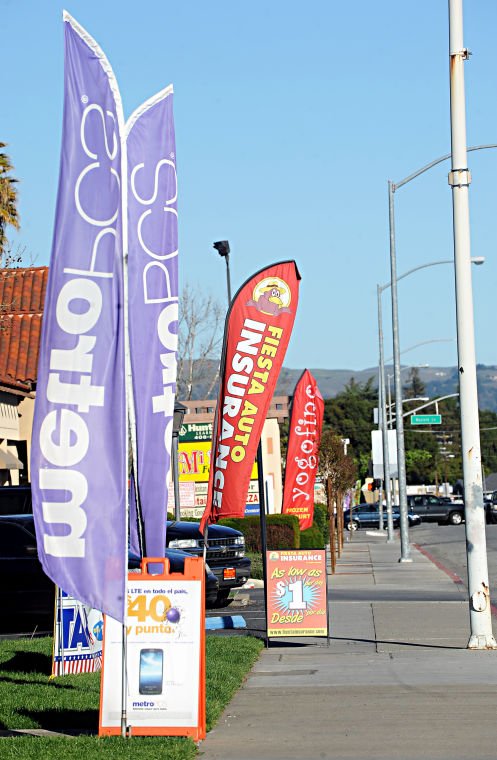
Two business owners and a representative from the Gilroy Chamber of Commerce appealed to the City Council, asking them to take another look at the city’s controversial sign ordinance—one that limits how long banners can be up and how much advertising can cover a business’ windows. In response to their concerns, the Council agreed to further explore some of the provisions.
Local McDonald’s owner Steve Peat told the Council at the Nov. 17 meeting he received a citation for violating a part of the ordinance that puts a cap on how much advertising can decorate windows. Not only did the business receive a fine for having too much clinging to the windows, they had to take down the advertising to avoid non-compliance, Peat said.
On the other side of 10th Street, employees at stores like Taco Bell in Gilroy are hand-trimming their window advertising to avoid reaching the overall limit set forth in the ordinance. This is causing a problem for many national franchises here in Gilroy, according to Chamber President and CEO Mark Turner.
“Some restaurants have begun to see some negative financial impact on their businesses as a result of their inability to continue to advertise with banners, window clings and things of that nature,” Turner said. “We know the intent initially was to get things cleaned up and keep things looking orderly—and we appreciate that—but as a result, some businesses are starting to get negative impacts.”
As part of a national franchise, Peat explained that McDonalds pays advertising companies to come up with a plan to highlight different products on a regular basis. But Peat said he received a ticket for hanging up the advertising his store is bound by franchise agreements to be using.
“We get a monthly calendar telling us what we’re supposed to merchandize along with the other 255 McDonald’s in the greater Bay Area,” he explained. “We pay an advertising fee for them to give us the recommendation on what we’re supposed to do and they come up with what we’re supposed to do. But if we can’t put up what we’re supposed to, then we’re doing two things; we’re in conflict with the rest of our businesses and wasting money because I’m sending it to the mothership and the mothership is giving me something I can’t use.”
The sign ordinance requires that no business have window coverings that exceed 25 percent of the window surface. Additionally, the local law prohibits banners from staying up beyond 45 days. After that period, no banners can be used for 90 days.
“You’ve got three banner showings a year when you calendar that thing out, and it just doesn’t coincide with the way we market,” Peat continued. “It makes it very difficult.”
“It’s really simple. Merchandising on windows affects us somewhere between 12 and 14 percent in sales and I’ve been doing this most of my life,” added Bruce Heller, who owns Wienerschnitzel in Gilroy. “When somebody talks about 12 to 14 percent of my sales, that’s a lot of money—and that’s tax base that we’re losing, too.”
Council Member Peter Arellano said the ordinance, in general, is an example of government overstepping its boundaries. He agreed the law, which took effect May 7, has hurt more business than it’s earned.
“We’ve injured small business by doing this,” Arellano said. “I think this is government’s way of really telling a business what’s good for them. If they (business owners) want to put up a dilapidated sign in front of their business, that’s on them. To me, if they really care about their businesses, they’ll put up good signs and they’ll change them. This is not the way to do it.”
The Council passed the sign ordinance on second reading in a vote of 6-1, with Arellano dissenting.
“I want to pass this ordinance and get it in the books, and then we can take a look,” Mayor Don Gage said. “You put an ordinance in, you give it some time and if it doesn’t work you go back and readjust it. We can fix that language and ask the people enforcing this to let this go for a period of time.”
While Arellano didn’t hold back his opposition, Council Member Perry Woodward was optimistic the Council and city staff can make changes to the ordinance to keep businesses happy in the future.
“I’m completely sympathetic to the notion you’re paying them to provide you with banners and advertising you then can’t put up,” he said. “Let’s make these improvements and continue to have a discussion.”
City staff members will review the provisions brought up by Peat, Heller and Turner and bring them back to the Council for reconsideration at a later date, which has not yet be determined. The Council reached a compromise with two other national franchise businesses—Fiesta Auto Insurance and Liberty Tax Service—earlier this year to allow them to uphold contractual obligations to use a costumed character as an advertiser outside the businesses’ doors. The original May 7 ordinance completely prohibited costumed character advertisers and A-frame signs, leading to uproar from the business community.
As the city continues to review its policies related to the ordinance, Council Member Dion Bracco said it’s important to consider where a majority of complaints the city receives about signs are coming from—other businesses. Competition between business owners who take their signage seriously and those who have no regard for it leads to a back-and-forth that keeps the city’s code enforcement officers busy responding to complaints, he said.
“One business goes and spends thousands of dollars, gets permitted and puts a sign up like a business should, and then the guy next door puts a raggedy banner up and leaves it up for years instead of going through the process and getting proper signage. It’s unfair competition,” Bracco added. “You’ve got to understand where the complaints are coming from. It’s business owners complaining about other business owners because some businesses in Gilroy are hurting legitimate businesses.”













